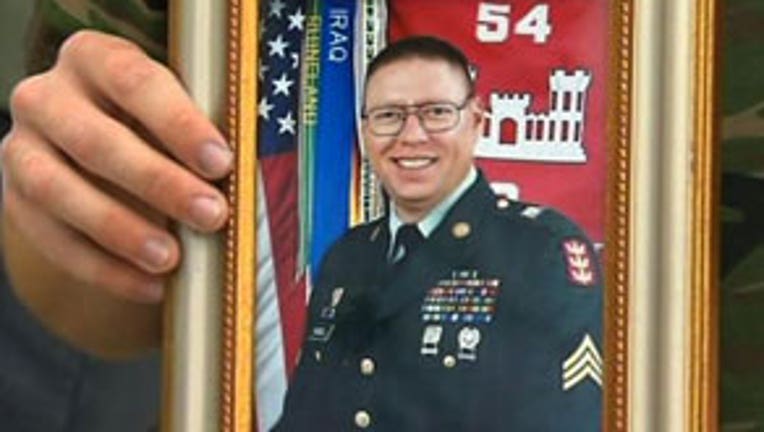Verdict expected Monday in JBLM court-martial over 5 U.S. deaths in Iraq

By Kim Murphy
Los Angeles Times
JOINT BASE LEWIS-McCHORD — A military judge is expected to render a verdict Monday in the court-martial of Army Sgt. John Russell for the killing of five fellow service members in Iraq.
The court-martial concluded Saturday with a military judge asked to decide whether the 14-year Army veteran was deluded by depression and despair or was executing a calculated plan of revenge against psychiatrists who had blocked his hopes for an early exit from the Army.
In closing arguments after a week of testimony, Judge David L. Conn was presented two starkly different views of what drove Russell, 48, to seize his escort’s M-16 rifle and gun down five people at the Camp Liberty combat stress center at the Baghdad airport on May 11, 2009.
While the defense says Russell was suffering from organic brain damage, major depression and post-combat stress that was aggravated by hostile mental health workers, Army prosecutors argued Saturday that Russell had been trying to paint himself as mentally ill even before the murders in an attempt to win early retirement and had then struck back “in the language of revenge” when a psychiatrist refused such a diagnosis.
Russell has already pleaded guilty to five specifications of murder, but the judge will determine whether the acts were premeditated, a key factor in whether he must serve life in prison or is eligible for parole.
“He wanted out,” Maj. Daniel Mazzone told the court, as Russell’s mother and sisters from Texas, along with family members of the victims, looked on.
Fearing that a threatened sexual harassment complaint could derail his career, Russell was looking for a way to salvage his benefits, but was told the day before the killings by psychiatrist Michael Jones that a mental disability retirement would require “some kind of suicidal psychotic crisis,” Mazzone said.
But when Russell saw Jones, a lieutenant colonel, again the next day, the psychiatrist said he had no intention of giving him “a golden ticket” out of the Army. “His career was over; his life was over; everything he had worked for the last 15 years was gone,” Mazzone said.
When Russell returned about an hour later, prosecutors say, he was looking for Jones, but wound up killing two patients, a bystander and two other mental health workers, including Navy Cmdr. Keith Springle, who had also briefly treated Russell in the days before the shootings. Jones escaped injury by jumping out a window.
Prosecutors described the methodical way Russell made his way through the small wood-frame clinic. The chief psychiatrist, Maj. Matthew Houseal, 54, was the first to be shot, through a window, in the head. Springle was next, shot dead in the torso, and then shot again -- after Russell entered the room where he lay -- in the back of the head. Sgt. Christian E. Bueno-Galdos died after being shot in the flank and screaming, "Oh God, oh God," as Russell moved in and shot him in the eye.
"This soldier is looking at him and pleading for his life, and he fires a shot into his eye," Mazzone said. "That's not a man confused about what he's doing."
But defense lawyers presented testimony from a leading forensic psychiatrist and the Army’s mental health board, which found that Russell suffered from severe depression with psychotic features and post-combat stress. A brain scan, they said, showed damage to the part of his brain that affects impulse control.
Russell, on his fifth combat deployment, had long sought help with sleep troubles — a colleague videotaped him crying in his sleep — and was stammering and crying for help in the days before the shooting. His commanders were so alarmed that they disarmed him and sent him for repeated visits to mental health clinics, civilian defense lawyer James Culp noted.
On the day of the shootings, Russell told Jones that the doctor either had to help him or he would kill himself, but Jones’ dismissive response was: “You’re fixed,” Russell earlier told the court. As Russell stormed out of his office, he said, Jones yelled at him and told him, “Soldier, you’ve made your decision.”
“And he closes the book on Russell’s life,” Culp said.
Russell, Culp said, decided to kill himself in a damaged mental state that started with despair and turned to rage.
"I would like to tell you that there's 90% evidence in this case that shows that Sgt. Russell was going to kill himself when he got back to the combat stress clinic," Culp said. "Ninety percent. But I can't do that. Seventy-thirty? Fifty-fifty? I don't know. Because the truth of the matter is that Sgt. Russell had frustration and anger and disappointment over the way he'd been treated."
Culp urged the judge to find at least that the first killing — that of Houseal, the chief psychiatrist — was committed without premeditation, even if the others were found to be calculated.
That would allow the judge to say, “I do think that you were sick,” Culp suggested. “I don’t think that you’re a homicidal maniac by nature. And that something very scary and very sad happened over a period of 10 days that represented a terrible storm.”
The Army has resisted saying Russell is mentally ill because of what it would mean about repeat combat deployments, Culp said.
“It’s been really hard for the Army to not want to dial up the vilification of John, because like a person with alcoholism, it’s not all John’s fault,” he said. “And if he’s not completely sane, then maybe something … maybe one of the three components that led up to this massacre — mental illness, organic brain damage and provocation — maybe we own a little bit of that.”
The judge is expected to render a verdict Monday morning, followed by a sentencing hearing to extend through much of the rest of the week.

